Once again I have been granted the great pleasure of presenting the members of the French Bermuda Bowl team, the new Bermuda Bowl champions. I will start with a brief description of our players. This will lead me to a history of French international bridge during the past 20 years or so. I am sure you will forgive me. Here are a few characteristics of our six champs (not being completely mad, I will present them in alphabetical order).
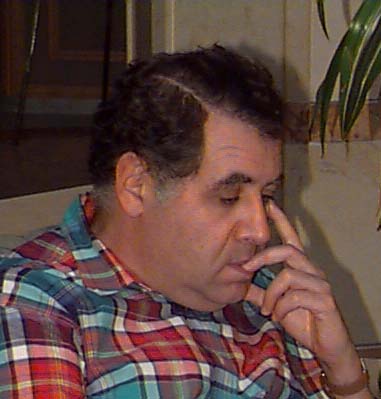 We shall begin with PAUL CHEMLA (he's just lucky once again for, in the alphabetic department he would be completely outclassed by the Norwegian Terje Aa and many others). Well, Paul, 53 and unmarried, has undoubtedly been an international bridge figure since the early Seventies. He was an accomplished student - he graduated from the celebrated Ecole Normal Superieure, one of the most famous, if not the most famous, high schools in France. He also has earned the title of Agrégé de Lettres. All this could have led to his becoming, one day or another, at least minister of National Public Education. . . but he decided to reserve his teaching talent for all bridge lovers. Of course he gives no lessons or conferences. He believes the best way to understand bridge is to watch him when he is playing. This, and some other details, earned him the nickname of enfant terrible du bridge. Personally I would not use the word terrible. Enfant suits him well enough. As such, if you know how to handle him, you'll find that he is finally a very nice guy. |
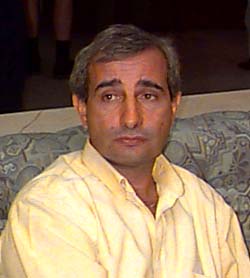 ALAIN LEVY, 48, who completed his medical studies before changing his mind, now teaches bridge in Paris and elsewhere at all levels. He lives with Anne-Frédérique, the sister of Veronique Bessis and a high-ranked player in her own right. They have a four-and-a-half-year-old son who follows his parents everywhere. No doubt we shall see him soon performing successfully at the bridge table. Alain, a very jolly "movie-looking" guy, seems never to be angry about anything or at anyone (although his perpetual smile might sometimes hide his true feelings). He started shining at the international level around 1981 and hasn't stopped going up since that time. |
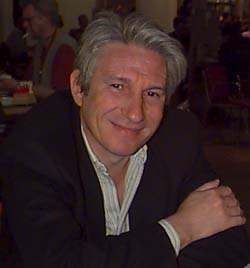 CHRISTIAN MARI, 53, a mathematician, has lived for a few years in the north of France (but not too far from Paris) with Dominique and his bergers allemend (Dominique says we should inverse the order, but we don't believe her). A really fantastic player, Christian won the European Championship as far back as 1974 in Herzlia and among other things the famous 1980 Olympiad in Valkenburg, facing Paul Chemla. He then retired from active competition from 1982 to 1989 (when he was second facing Jean-Christophe Quentin in Turku). He came back in 1995 and everybody knows what he has done since then. |
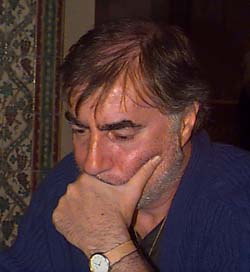 HERVE MOUIEL, 48, had started medical studies but stopped three or four years later to concentrate (most successfully) on high-level bridge. A very, very talented player, he married Isabelle after the victory in Salsomaggiore Olympiad and now lives in Cannes (there are worse places around the world). Their two-and-a-half-year-old son Jeremie calls his father here every day to deliver him his latest instructions. |
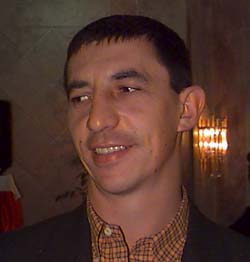 FRANK MULTON, 33, runs a bridge club in Nice with his wife Catherine and their six-year-old daughter. He too is a very impressive player and one of our best guarantees for the future. |
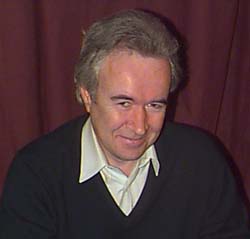 Last but not least we find MICHEL PERRON, 46. It is difficult to find the adequate word to describe his enormous bridge talent, and he also has very good humorous qualities. He and his wife Martine live in Paris, and they are an example of calm and happiness. What these six guys did for French international bridge these 20 years is incredible. I had the honour of captaining the French open teams from 1979 to 1989 in about 15 different international events (including the Juniors with Frank Multon). Each time, al least one of the six heroes, and more often three or four were present. The final result was 13 medals - three gold, four silver and six bronze - although they often played musical chairs as regards the partnership arrangements. |
Of course during that period The Six were not alone. They have been helped by a few other French champs, especially Michel Lebel and Philippe Soulet. Lebel and Soulet apart from winning one Olympiad, a European championship and a few medals of all sorts while associated with one or more of our six latest supermen, won the 1982 Rosenblum Cup in their own right (with Albert Faigenbaum and Dominique Pilon). I must also cite Philippe Cronier and Jean-Christophe Quentin, who often shared the honour.
After my retirement from captaincy, it did not take me long to realise that my boys could do at least as well without me! True, we had two bad years - in 1991 and 1993 - but in the meantime Chemla-Perron and Lévy-Mouiel, helped by Pierre Adad and Maurice Aujelieu, brilliantly won the 1992 Olympiad under the very inspired captaincy of José Damiani himself.
That was not the end of it. Three years later I finally convinced Jean-Louis Stoppa, a retired physician and a great international champion himself, to accept the captaincy of the French team. His success was complete - Mari-Bompis, Lévy-Mouiel and Swarc-Multon brilliantly won the Olympiad title in Rhodes last year. Stoppa captained again in the Europeans at Montecatini but he was a little less successful, probably because, apart from Chemla-Perron, there were two brand new partnerships - Mari-Lévy and Mouiel-Multon. Nevertheless our men managed to qualify at the last minute.
And here they are, the seven of them, trying to beat the "enormous" USA team consisting of Nickell-Freeman and the two "monster" pairs - Hamman-Wolff and Meckstroth-Rodwell. Although I like the Americans, I naturally wanted my team to win. This is the second lesson in modesty for your humble servant. I am supposed to be their "adviser". However, Stoppa, after listening politely to two or three of my general opinions about captaincy, never really felt the need to seek my advice. Since then I have been forced to advise myself . . . just to see. Next time I must find some other way to star on the team. Supervisor? Maybe - but supervisor of what? Finally we must thank once more the AXA Insurance Company, the second largest in the world), who strongly support our Open team year after year. We owe very much of our success to them. Insurance and bridge have the same approach - analysis before synthesis, calculation of probabilities, checking before the contract. AXA - the champion!